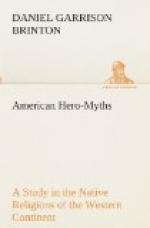[Footnote 1: Franco, Noticia de los Indios Guaymies y de sus Costumbres, p. 20, in Pinart, Coleccion de Linguistica y Etnografia Americana. Tom. iv.]
This becomes an added difficulty in the analysis of myths, as not only were the names of the divinities and of localities expressed in terms in the highest degree metaphorical, but they were at times obscured by an affected pronunciation, devised to conceal their exact derivation.
The native tribes of this Continent had many myths, and among them there was one which was so prominent, and recurred with such strangely similar features in localities widely asunder, that it has for years attracted my attention, and I have been led to present it as it occurs among several nations far apart, both geographically and in point of culture. This myth is that of the national hero, their mythical civilizer and teacher of the tribe, who, at the same time, was often identified with the supreme deity and the creator of the world. It is the fundamental myth of a very large number of American tribes, and on its recognition and interpretation depends the correct understanding of most of their mythology and religious life.
The outlines of this legend are to the effect that in some exceedingly remote time this divinity took an active part in creating the world and in fitting it to be the abode of man, and may himself have formed or called forth the race. At any rate, his interest in its advancement was such that he personally appeared among the ancestors of the nation, and taught them the useful arts, gave them the maize or other food plants, initiated them into the mysteries of their religious rites, framed the laws which governed their social relations, and having thus started them on the road to self development, he left them, not suffering death, but disappearing in some way from their view. Hence it was nigh universally expected that at some time he would return.
The circumstances attending the birth of these hero-gods have great similarity. As a rule, each is a twin or one of four brothers born at one birth; very generally at the cost of their mother’s life, who is a virgin, or at least had never been impregnated by mortal man. The hero is apt to come into conflict with his brother, or one of his brothers, and the long and desperate struggle resulting, which often involved the universe in repeated destructions, constitutes one of the leading topics of the myth-makers. The duel is not generally—not at all, I believe, when we can get at the genuine native form of the myth—between a morally good and an evil spirit, though, undoubtedly, the one is more friendly and favorable to the welfare of man than the other.
The better of the two, the true hero-god, is in the end triumphant, though the national temperament represented this variously. At any rate, his people are not deserted by him, and though absent, and perhaps for a while driven away by his potent adversary, he is sure to come back some time or other.




